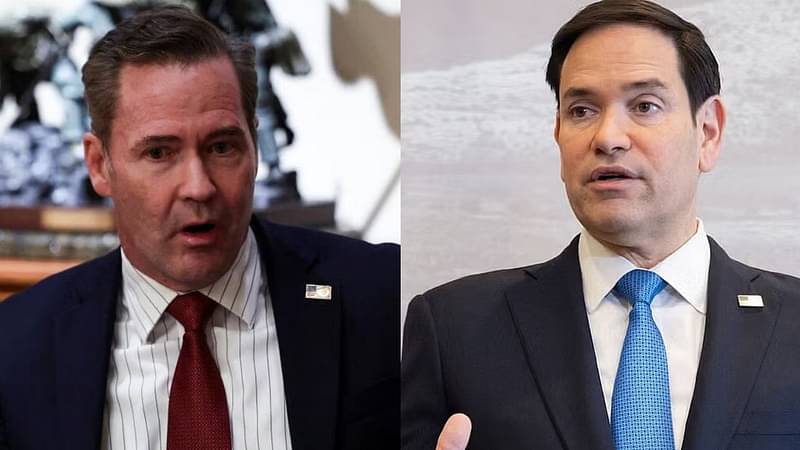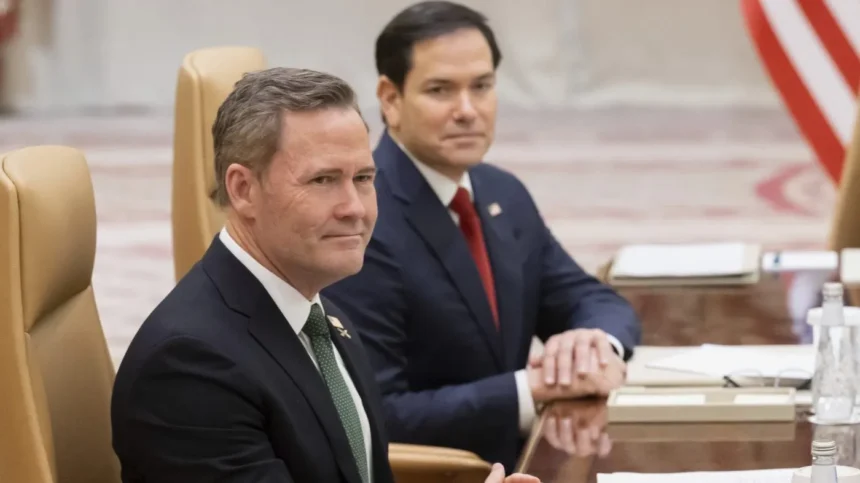On Thursday, President Donald Trump announced a major reshuffle in his administration, nominating National Security Adviser Mike Waltz to serve as the next UN Ambassador. This move marks the first significant staff change since Trump’s second term began. Here are the key takeaways from this transition:

1. Waltz’s New Role as UN Ambassador
Mike Waltz, who has been at the helm of the National Security Council, will now shift gears to represent the United States at the United Nations. The move follows widespread speculation about his future in the administration after several internal challenges. Despite reports that Waltz was to be removed, Trump’s announcement surprised many political analysts, signaling a change in direction for the U.S.’s global diplomatic strategy.
2. Marco Rubio’s New Temporary Role
In an interim measure, Secretary of State Marco Rubio will take over Waltz’s responsibilities as National Security Adviser. This decision adds additional pressure to Rubio, who is already overseeing the State Department. Rubio’s new role encompasses four major responsibilities, including those of National Security Adviser, Secretary of State, National Archivist, and Acting Administrator of USAID.
3. Uncertainty Within the White House
Waltz’s removal from his post comes amid growing concerns within the White House. A source close to the situation revealed that Waltz’s influence had waned after a controversial incident involving a sensitive military message shared with a journalist. This incident, coupled with decreasing support among White House staff, made his departure seem inevitable.
4. Potential Senate Confirmation Battle
Waltz now faces the challenging task of navigating the Senate confirmation process for the UN Ambassador role. The nomination is expected to be contentious, with Trump’s delay in nominating a new ambassador earlier in his term potentially affecting Waltz’s prospects. Some close to the president have expressed that the role of UN Ambassador may not be a high priority for Trump, who has historically been more focused on domestic policies.
5. A Shifting Dynamic Within the National Security Team
Waltz’s ouster and the subsequent reshuffling of roles indicate a broader shift in the National Security Council. Several other officials, including Deputy National Security Adviser Alex Wong, are reportedly expected to leave their positions. Meanwhile, far-right activist Laura Loomer’s involvement in influencing staffing decisions highlights the growing internal divisions within Trump’s team on national security matters.
Hegseth also has more far support outside the administration through the Trump-inspired MAGA movement than Waltz, who was viewed with deep suspicion among the base. Plus, unlike Hegseth, replacing Waltz does not involve a Senate confirmation fight.
Still, Hegseth has faced internal scrutiny. Wiles has ordered Hegseth and the Pentagon to step up their performance, offering an admonition weeks ago that there is “no room for more mistakes or embarrassments.”
But behind the scenes, some administration officials had begun quietly discussing an off-ramp for Waltz over the last several days. Trump has expressed frustration with him on multiple fronts, including the Signal episode. He was also irritated the Florida congressional race to replace Waltz was closer than expected, two sources familiar with the conversations told CNN.
“President Trump lost confidence in him a while ago,” one source said.
Waltz boarded Marine One with Trump on Tuesday, but when his colleagues boarded Air Force One about 10 minutes later, he instead remained on the tarmac at Joint Base Andrews. One White House official said he was never slated to travel with the president to Michigan, but the move was viewed as odd by other aides inside the administration.
Asked about the impact of Waltz’s dismissal as national security adviser, before Rubio was named as a replacement, multiple foreign officials — including some from the Middle East — expressed apprehension about who would fill the role.
“Of all of them, we never thought he would be the first [to be fired],” said a senior western official.
Conclusion
The departure of Mike Waltz as National Security Adviser marks a turning point in Trump’s second term, as the president continues to shape his administration’s foreign and national security strategies. With Marco Rubio temporarily assuming Waltz’s role, the U.S. looks to navigate an increasingly complex geopolitical landscape. The Senate confirmation of Waltz as UN Ambassador could signal further political drama as the Trump administration deals with internal friction and staff realignments.
Stay tuned for updates on the confirmation process and the ongoing staff changes in Trump’s administration.









